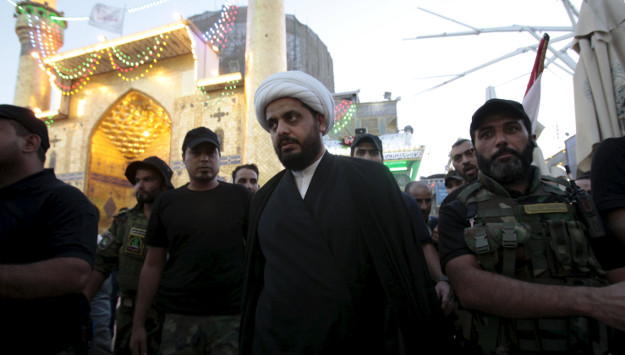The head of the parliamentary bloc of Asa’ib Ahl al-Haq, an Iranian-backed Iraqi militia group, has reacted angrily to a U.S. Congressional bill that designates the group as a terrorist entity for its association with the Iranian Quds Force, acts of violence against American troops, and sectarian attacks against fellow Iraqis over the past decade. “We take a pride in confronting the [U.S.] occupying forces. We have rendered a lot of martyrs to our country, but ultimately we have defeated the occupiers in most areas in the country,” Ahmed al-Kinani, the head of al-Sadiqoun parliamentary bloc representing AAH said in an interview with Kurdish outlet Rudaw. Kinani called on the Baghdad government to respond to the action against the group by the U.S. Congress. “This is a sign of the American government’s defeat and proves that we’re moving in the right direction and we’re proud of it,” he added. The AAH official, however, emphasized that the U.S. designation would not hinder the group from playing an influential role in Iraqi security and politics, pointing out that AAH won 15 parliamentary seats in the recent elections. He accused Washington of meddling in Iraq’s internal affairs and claimed that the designation reflected U.S. anxiety over the group’s success.
Kinani defended AAH’s acts of terrorism against American troops prior to the 2011 U.S. withdrawal, arguing that it is legal to fight any foreign occupation forces. He praised Iran for helping the PMF and Iraqi people in the fight against ISIS.
The lawmaker further claimed that AAH, despite its tense relationship with the U.S., has good relations with some Arab and European countries. He did not name any countries but said the group often held meetings with foreign diplomats in Baghdad.
Asked about the future of American military bases in Iraq, Kinani said that if the bases were established without the consent of the Iraqi government and parliament, they needed to be closed down.
Comment: The Congressional bill seeking to designate AAH and Harakat al-Nujaba, another Iranian-sponsored Iraqi militia group, was first introduced on November 3. The bill, entitled “Iranian Proxies Terrorist Sanctions Act of 2017,” sought to impose terrorism-related sanctions on the two groups, which have a long history of violence against American forces in Iraq. Since then, the two groups have threatened violence against American troops stationed in Iraq helping the Iraqi security forces. The bill, now amended, is set to go to the Senate for approval.
AAH participated in Iraq’s May 12 parliamentary elections as part of the Fatah Alliance, which is dominated by Iranian-backed militia groups. Its leaders had said that by translating AAH’s military success into political power, the group aims to further strengthen the PMF as a separate military institution and force the American troops to leave the country. It remains to be seen whether the Fatah Alliance, which came second in the polls, will be part of a new government coalition in Iraq, but its electoral success means the group will exert a lot of influence in the next Iraqi parliament.
AAH and Nujaba both splintered from Muqtada al-Sadr’s Mahdi Army and represent the most hardline Shiite, pro-Iran factions in Iraq. The two groups have also send militiamen to Syria to prop up the embattled regime of Bashar al-Assad and they have close ties with the Lebanese Hezbollah.
According to the U.S. government accounts, the Lebanese Hezbollah upon a request by the Iranian government helped form and train AAH in 2005 to carry out attacks against the U.S.-led coalition forces in Iraq. Qais al-Khazali, the secretary-general of AAH, has reportedly pledged allegiance to Iran’s Supreme Leader Ali Khamenei, and his group takes orders from Major General Qassem Soleimani, the head of Iran’s Quds Force. This is despite the fact that AAH is part of the PMF organization, which has been incorporated into the Iraqi security forces and receives government salaries.
Khazali was arrested by the U.S. military in 2007 for his alleged role in high-profile attack in Karbala that had killed five American service members. But he was released two years later along with other AAH members – apparently in an exchange for a British hostage. The U.S. and British government denied it was a prisoner exchange. Last year, Khazali hinted that his fighters could blend in with Iraqi troops to kill American advisers in Mosul.



